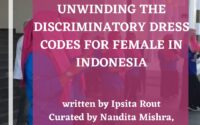COVID -19: Quarantine and your Legal Rights
This article has been written by Pratha Waghmare from University of Mumbai Law academy, Maharashtra and has been curated by Yashasvi Kanodia from NMIMS’ Kirit P. Mehta School of Law, Mumbai.
The coronavirus continues to spread around the world and in such difficult times, we have grown familiar with hearing the word ‘quarantine’. What does this word mean? How has it been defined in the law? What are the Acts related to it? We will discuss all these aspects in the article.
The word “quarantine”, which has been derived from the Italian word “quaranta giorni”, means 40 days. Evidence suggests that the practice of quarantine dates back to the 14th century, to save coastal cities from plague epidemics. Therefore, quarantine in legal terms can be defined as “the limitation of activity and / or separation of suspicious people from other people who are not ill or suspected of baggage, freight, containers, aircraft or transport facilities, freight and postal parcels in order to avoid the possible spread of infection or contamination”.
Legislations related to Quarantine in India
- Epidemic Diseases Act, 1897
A 123-year-old British colonial era law that was enacted to combat the bubonic plague epidemic that erupted in the state of Bombay at the time is the main central legislative framework for preventing the spread of epidemic diseases such as swine flu, cholera, malaria and dengue.
Section 2 A of the Law authorizes the Union Government to take necessary measures and prescribe regulations for the treatment of dangerous epidemic diseases in the ports of entry and exit.
Under section 2, the states have the power to take special measures to deal with the epidemic within their jurisdictions, therefore each state is convinced that at any point in time, if the State or any part of its territory is threatened with one outbreak of any dangerous epidemic disease and when it considers that the ordinary provisions of the law are insufficient for the purpose; all measures, including quarantine, can be taken to prevent the epidemic.
Section 3 specifies that any person who disobeys any order under the 1897 Act must be held liable for a crime punishable under Section 188 of the Indian Penal Code (IPC) and a person is liable in the event of a conviction, to be sentenced to prison for one month or a fine or both. According to Section 4 of the Act, no legal action or legal proceeding will be brought against any person or authority for anything done in good faith.
This law has also been called “archaic”, as it places emphasis on quarantine, but does not mention various scientific methods of preventing epidemics, such as vaccination and public health response.
- Disaster Management Act, 2005
As the Central Government has declared COVID-19 as a “notified disaster”, there is another law that comes into play: Disaster Management Act, 2005.
Disaster as has been explained in Section 2 (a) means a catastrophe, accident, calamity or serious event in any area resulting from natural or man-made causes or from accident or neglect resulting in substantial loss of life or human suffering or harm and destruction of property or damage or degradation of the environment and it is of such nature or magnitude that goes beyond the ability to face the community of the area concerned.
This law allows the government to access the “National Disaster Response Fund”. Using this fund, the government will be in a better position to finance medical facilities and be authorized to set up a range of agencies to manage the ongoing crisis.
Section 10 (2) (1) of the Law allows the National Executive Committee to instruct the government. Regarding the measures they must take, it is also said that anyone who violates these containment measures will be prosecuted in accordance with the provisions of sections 51 to 60 of the Disaster Management Act of 2005, in addition to the lawsuits in section 188 of the IPC.
This law is also used in the dissemination of false news; Section 52 of the law states that people who intentionally make false statements to obtain governmental benefits can be imprisoned for up to 2 years.
Article 58 of the Law also states that if a company or entity commits a crime, the person who committed the charge at the time of the crime will be liable. This provision can also be used to ensure that workplaces allow employees to work from home or pay employees their wages.
- National Health Bill, 2009
This bill was presented to recognize health as a fundamental human right and establishes that every citizen has the right to the highest possible level of health and well-being.
It places obligations on the government to ensure health for all. Chapter 3 of this bill elaborates on the rights of medical care, including terminal care for all. However, it lacks the ethical framework for the protection of human rights during this epidemic. Reference can be made to the Mexican Public Health Emergency Response Law which clearly describes the individual civil rights of a person quarantined in the midst of a health emergency.
Other Laws in India
In these difficult times, it is our duty to take all reasonable precautions and most people are unaware of the laws under which they can be prosecuted for such actions dangerous to the health and safety of others.
In our country, disobedience to the quarantine rule is punishable under Section 271 of the Indian Penal Code, 1860, with the imprisonment of any description for a period that can extend to six months or with a fine or both. Failure to take the necessary precautions despite being aware of the possibility of spreading this infection or disease is punishable under sections 269 and 270 of the IPC. Pursuant to Section 269, anyone who performs unlawful or negligent acts and is aware of or has reason to believe that the infection can spread any life-threatening disease will be punished with imprisonment of one of the descriptions for up to six months, or with a fine and imprisonment.
Under Section 270, anyone who commits a malicious act, and knows or has reason to believe that the infection can spread any potentially lethal disease, will be punished with the imprisonment of any description for a period that can be extended to two years, or, or both. Malignant neoplasm is characterized by highly virulent, infectious and potentially life-threatening diseases. Disobeying the rules prescribed for social removal, coughing or sneezing without covering the nose and mouth, not wearing masks in public, ignoring the rules of social isolation, lingering on the streets in groups, socializing without taking into account the prescribed rules, etc. are all offenses punishable under Section 270.
There are also some laws that focus on putting visitors in quarantine, such as the Aircraft Act and the rules of Indian planes that authorize government-appointed health officials to control people entering the country from abroad. The agents can review the aircraft, its passengers and crews and can undergo medical tests. They must follow precautions related to the quarantine period, when there is a spread of an epidemic.
Quarantine laws in other countries
In 1824, the United States Supreme Court, through a historic ruling, recognized quarantine power as unlimited state power and according to the Center for Disease Control and Prevention (CDC), quarantine power is generally granted to states, countries and cities to protect public health. While analyzing British quarantine laws, the Parliament of England added the Health Protection Regulation, 2020, which according to Section 45R of the Public Health Act (Disease Control) of 1984, authorizes the police, public health and immigration officers to detain suspect people and quarantine them.
During the investigation in North Korea, an official returning from Wuhan was reportedly executed for going to the public toilet in violation of his quarantine, and the country promised to “rule under military law”.
Conclusion
It has been seen that there are various laws and regulations governing quarantine, but such legislations are inadequately framed since they have been derived from various combinations of laws such as the Epidemic Diseases Act of 1897, which has been labeled as “archaic” and such other laws which are silent on various quarantine and home quarantine mechanisms during the pandemic. Adequate guidelines must exist for the implementation of the quarantine and the establishments of Courts that can help manage these health disasters, and there must also be a set of rules for individual civil rights during this crisis. Therefore, we hope that after dealing with these crises, quarantine laws should be visited and made clearer and more intact so that public health can always be a priority.
These are tough times. We must all understand the extent of the catastrophe that lies ahead if we do not take into account the precautionary measures ordered by the state. We must all follow the rules prescribed for hygiene, such as frequent hand washing, social removal, the use of masks, the use of disinfectants, the safe disposal of used fabrics, staying in the house, self-isolation during illness and reporting to medical care authorities immediately after the development of any symptoms. More than laws and regulations, it is public support that can help us curb this pandemic and go back to leading a lifestyle of normalcy (or is this the new normal?).


